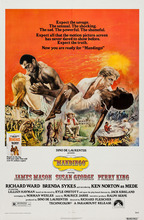|
Mandingo (7-May-1975)

Director: Richard Fleischer Writer: Norman Wexler From novel: Mandigo by Kyle Onstott From a play by: Jack Kirkland Keywords: Action/Adventure, Blaxploitation, Slavery, Rape, New Orleans, Boxing Plantation owner Hammond Maxwell discovers and develops the fighting abilities of one of his slaves, played by heavyweight champion boxer Ken Norton. Mandingo was a box office success at the time, and it showed a truer picture of the slavery situation in the South than other films. Since then it seems to have languished in relative obscurity. Richard Fleischer refused multiple times offers by Dino de Laurentiis to direct this film. Followed by a sequel, Drum (1976).
| Name | Occupation | Birth | Death | Known for |
|---|
| Paul Benedict |
Actor |
17-Dec-1938 |
1-Dec-2008 |
Harry Bentley on The Jeffersons |
| Susan George |
Actor |
26-Jul-1950 |
|
Straw Dogs |
| Perry King |
Actor |
30-Apr-1948 |
|
Class of 1984 |
| James Mason |
Actor |
15-May-1909 |
27-Jul-1984 |
North by Northwest |
| Ben Masters |
Actor |
6-May-1947 |
|
Julian Crane on Passions |
| Debbi Morgan |
Actor |
20-Sep-1956 |
|
Dr. Angela Hubbard All My Children |
| Ken Norton |
Boxing |
9-Aug-1945 |
18-Sep-2013 |
Fought Muhammad Ali |
REVIEWS Review by anonymous (posted on 9-Nov-2006) I saw this movie when it first came out in 1975 and I was living in New Orleans. Of course the Deep South wasn't too thrilled with the movie because it told the truth and exposed the South's dirty laundry. There's a saying in the Deep South (pre-1960s): "The only free people are the White men and the Black woman." Mandingo reveals the double-standard of that era. The White woman (Susan George) is sexually frustrated because "nice women did not enjoy sex and only did it out of duty" so the White man would often visit whores, prostitutes, or (oftentimes rape) Black women. [No, Susan George's character was NOT a nympho; she was sexually frustrated because her husband would not satisfy her.] Meanwhile, any healthy, normal, unfulfilled (White) woman is left sexually frustrated if treated with this double-standard; which is why the White woman (Susan George) took on a Black lover, the slave (Ken Norton), leaving him stuck between a rock and a hard place: if he didn't put out, she threatened to accuse him of rape... and if he did, she COULD accuse him of rape. Meanwhile, (Susan George's husband (Perry King) is out having his fun in whorehouses and takes on a Black slave (Brenda Sykes) whom he treats well and even buys an expensive set of earrings and gives his wife the matching necklace. Imagine the wife's anger when she sees the slave-girl with the earrings! The movie is full of heat, lust, and passion. You could almost feel the hot, muggy, humidity indigenous of New Orleans. It is a magnificent movie (it took an Italian from Italy, De Laurentis, to produce it) because it portrays the brutality of slavery, the double-standards, and the hypocrises of such a wretched system. It all ends in tragedy. (Susan George) is "with child"... but it's not her husbands. When the baby is born brown (African-American), the family kills the baby and the husband (Perry King) poisons his wife and (Ken Norton) is boiled alive... and of course, all this is done under the instruction of (Perry King's father) James Mason. Interestingly, the movie also portrays another truth about the Old South: not everybody who owned a slave was rich. (Perry King's) family might be called middle-middle class today. Even some lower-middle class people had slaves. (That's like a person earning $15/hr owning a slave.) And yes, unfortunately, most slaves were treated brutally, fed only corn mush and scraps, and worked to death. It's a painful movie to watch, because of the brutality; but it tells the truth about slavery.//vw
Do you know something we don't?
Submit a correction or make a comment about this profile
Copyright ©2019 Soylent Communications
|